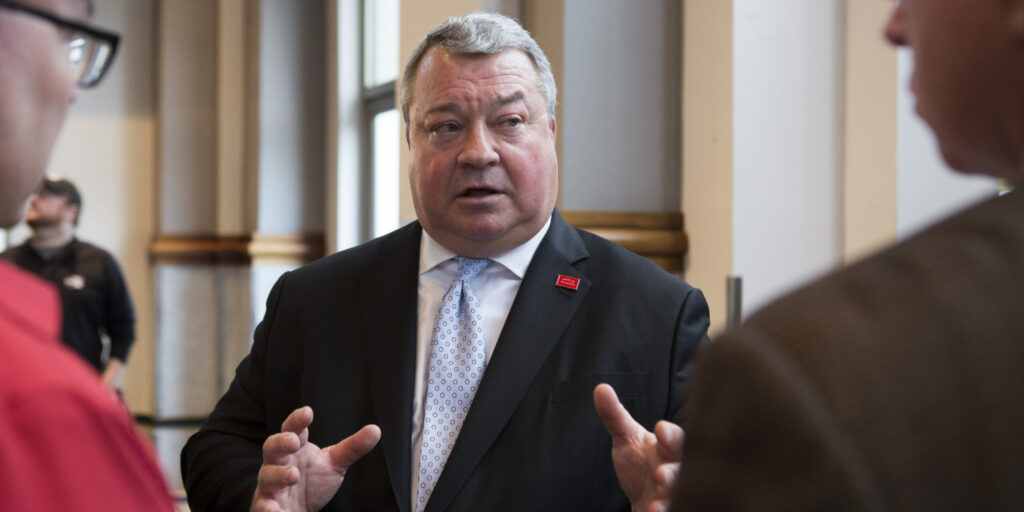BREMEN, Alabama – Agricultural equipment manufacturer AGCO Corp. announced plans today to invest $5.7 million to relocate production of its Farmer Automatic Aviary Systems to Cullman County as part of a project that will create 50 jobs.
Alabama Governor Kay Ivey joined company officials and local leaders at AGCO’s facility in unincorporated Bremen for a ceremonial ribbon-cutting on a 32,000-square-foot expansion that will house the new production line.
“AGCO’s addition of the Farmer Automatic production line in Bremen is a significant step for this area and for all of rural Alabama. I’m very grateful that these products will now, not only be Made in America, but also Made in Alabama,” Governor Ivey said.
“Today, we’re celebrating 50 more Alabamians earning a wage, and as a native of rural Alabama, I’m proud that we’re also celebrating the fact that companies can, indeed, thrive in rural Alabama,” she added.
Duluth, Georgia-based AGCO’s Farmer Automatic line offers innovative products for ultramodern poultry farming. Farmer’s Automatic’s pullet rearing technology allows farmers to take advantage of automation to boost efficiency.
The Farmer Automatic production line is moving from Laer, Germany, to the facility in Bremen where AGCO began operations 10 years ago. The company is also marking a decade without a work stop accident at the Alabama facility.
“AGCO is excited to expand our investment in Cullman County at our Bremen facility,” said Hans Lehmann, vice president and general manager, AGCO Grain & Protein North & South America. “We like to say our products are ‘Proven and Dependable.’ The same can certainly be said about Cullman County.
“The fact we’ve not had one lost time safety incident speaks volumes to the quality of the workforce in the county,” he added. “And with the community’s commitment to assist with industrial training and critical infrastructure improvements, we’re confident in the future.”
At the event, Lehmann said AGCO, a global company, quickly “determined that Farmer Automatic should be made in Alabama.” The company’s employees at the Cullman County plant sported “Made in Alabama” T-shirts at the ceremony and presented Governor Ivey with one after the ribbon cutting.
RURAL GROWTH
Dale Greer, director of the Cullman Economic Development Agency, said AGCO’s expansion project was made possible through the cooperation of state, county and city leaders.
“We are very fortunate to be able to work with our state and county leadership to keep a great company growing in Cullman County,” Greer said. “It’s a big advantage to have the ability to ensure companies succeed in the rural parts of the county the same way they succeed in more urban areas.”
State Senator Garlan Gudger of Cullman said Alabama’s leadership is focusing on driving economic growth in the state’s rural areas through infrastructure improvements and job creation.
“To have a globally renowned industry in AGCO locate, grow, and expand here is a testament to the generations of hardworking families in this area and the flourishing Alabama economy,” he said.
“Every day, it seems as if there is a new headline about some region in Alabama that is growing, expanding, and adding more jobs, but to see it happen here in Bremen, in rural Alabama, truly is special.”
Greg Canfield, secretary of the Alabama Department of Commerce, said Alabama’s lead economic development agency is taking steps to elevate the competitiveness of the state’s rural areas when it comes to attracting new investment and jobs.
Under the Alabama Jobs Act, projects locating in certain “targeted,” or rural counties qualify for enhanced incentives. Earlier this month, Secretary Canfield announced that Commerce is creating a rural development management position to help rural areas better prepare for the economic development process.
“While we have had success in facilitating rural economic development, we want to continue to improve and do more to help the state’s rural counties and small towns and cities,” he said. “We’re committed to providing additional resources to stimulate rural development, and the creation of the rural development manager position will move that effort forward.”
(Courtesy of Made in Alabama)













